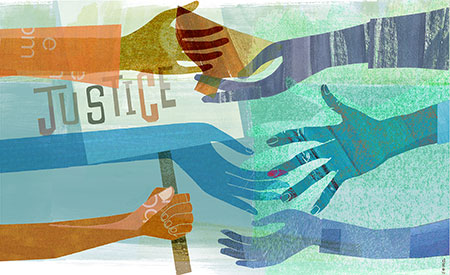Being Jewish
Commentary
What Makes a Good Jew? For Many, It’s Tikkun Olam

How often have you heard someone say: “I’m a bad Jew.” To many, this self-identification means failing to attend synagogue, keep kosher or observe Shabbat. Yet, even using those metrics, “good Jews” know that rituals are not enough.
On Yom Kippur, those who attend synagogue hear the words of the prophet Isaiah (58:5-7) condemning the hypocrisy of ritual without deeds:
Is such the fast I desire a day for
people to starve their bodies?…
No, this is the fast I desire….
It is to share your bread with the
hungry, And to take the wretched
poor into your home….
Neither sacrifice in biblical times nor prayers today was ever meant to be offered in isolation. The values expressed in Jewish liturgy and texts have always been intended as a guide for life.
Synagogues traditionally define themselves through the pillars of Torah, prayer and acts of loving-kindness. Adding a fourth pillar of civic engagement—ensuring that a congregation’s public actions reflect Jewish values—allows Jews to embrace the values of Torah both inside and outside the synagogue walls. Civic engagement expands acts of loving-kindness that are often termed social action or tikkun olam. They help address systemic change—for example, by alleviating the pain of homelessness not only by working in shelters but also by meeting with officials to advocate for expanding affordable housing.
In 2015 and 2016, we interviewed 50 rabbis and lay leaders at Reform, Conservative and unaffiliated synagogues across the United States to learn how their congregations effectively pursue civic engagement and what impact this engagement has on their congregations. Among these were synagogues advocating for marriage equality in Washington State, lobbying for gun violence legislation in Massachusetts and promoting higher wages for Florida tomato pickers.
Many congregants and synagogue board members debate whether sermons should address contemporary politics and whether political activism belongs in their communities at all. A common thread we found in our research was that thoughtful listening campaigns prior to action were an effective way of preventing divisiveness, which is a concern often expressed about embarking on this work.
Our research also found that civic engagement creates a meaningful connection for congregants—sometimes the only one. Janet Goldenberg, a former litigator, was a key leader at Temple Beth Elohim in Wellesley, Mass., in its successful efforts to lobby for more restrictive gun legislation in her state. If not for this advocacy work, she said, she might not have maintained the membership she started when she enrolled her son in the temple’s Sunday school some 15 years ago.
Her story was echoed by others who cited indifference to worship services but said they found spiritual comfort outside the sanctuary. Across the country, as the synagogue became more relevant to their daily lives, some members became more involved.
When our synagogues embrace civic engagement, we fulfill Isaiah’s mandate to address hunger through food justice. Likewise, Leviticus (19:34) reminds us not to wrong foreigners who live among us: “The strangers who reside with you shall be to you as citizens; you shall love each one as yourself, for you were strangers in the land of Egypt.”
To prevent Isaiah’s plea from fading after the High Holidays this year, ask yourself: “Which injustice troubles your soul?” Ask your fellow congregants: “What keeps you up at night?” And when you leave synagogue after the last shofar blast, rethink what it means to you and your congregation to be “good Jews.”
Rabbi Judith Schindler and Judy Seldin-Cohen co-authored Recharging Judaism: How Civic Engagement is Good for Synagogues, Jews, and America (CCAR Press). Schindler is a professor of Jewish studies at Queens University of Charlotte in North Carolina. Seldin-Cohen edits and contributes to FaithInHousing.org and chairs the A Way Home housing endowment.











 Facebook
Facebook Instagram
Instagram Twitter
Twitter
Dr Arthur Pitz says
Todah rabah for this thoughtful commentary.